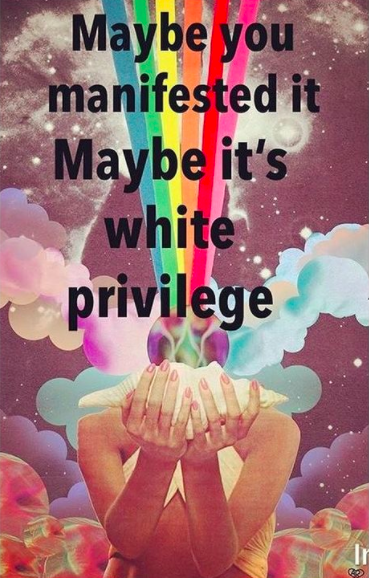I have come across this image from @c_o_r_i_n_n_a__r_o_s_e_l_l_a a few times, but it was really sticking me this week.
I was in space where a white woman was using her spirituality to excuse her dismissiveness toward structural harms. (See Carla Sherrell and Judith Simmer-Brown’s incredible article Spiritual Bypassing in the Contemporary Mindfulness Movement for more on the specifics of Spiritual Bypassing and it’s harms). I regularly see colleagues, particularly white women, chalk up their success to manifesting. Even my therapist, another white woman, who I appreciate deeply, tells me to manifest.
But you cannot out-manifest systemic oppression. You cannot out-manifest political harm. And every time I hear or see this call to manifest, to be aware of the energy we are putting out, etc., a bunch of alarm bells go off for me.
Manifestation can be another way to absolve us of communal responsibility. Away to keep us ignorant of structural racism, patriarchy, and all the other -isms that shape our systems. It gives us an excuse to not be informed on our state and local policies, or vote in ways that support the people we say we love.
Because if we are each responsible for manifesting our own destiny, nothing else matters. We just have to “want it more” to throw back to an SNL sketch of Hilary Clinton and Tina Fey. Or, as I so often hear in my circles, “love each other more”.
Just like we can’t out-manifest structural harms, we can’t out love it either. Not without actual behavior change that results in changed policies and institutions.
Personal practices that have an element of spiritual bypassing seek to avoid or explain away pain (“every thing happens for a reason”) and discomfort (“oh, the vibes were off, so I left”), rather than see them as markers for growth and learning. I invite you, and me, to note the next time we want to run from discomfort. Is it because remaining there would actually challenge my worldview, and perhaps require me to change? Then I should probably stay.
A colleague and I were discussing over the weekend the real, hard-work of accountability. If we actually mean what we say about doing better, then we have to be accountable to when we don’t live up to our own expectations. And that is certainly not comfortable. But it is a communal responsibility. Community requires accountability. And accountability only comes from facing, not dismissing reality.

